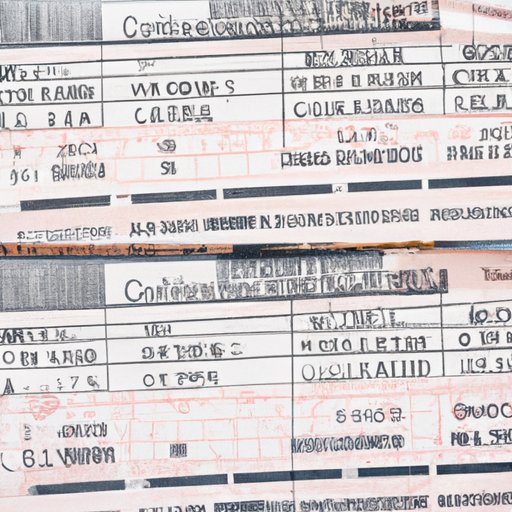
Introduction
Have you ever received a check and let it gather dust in a drawer or forgotten about it entirely? It’s easy to do, but the problem is checks have an expiration date, and if you wait too long to cash them, you’ll face consequences. In this article, we explore the length of time before a check voids, how to cash stale checks, reasons why checks can become stale, legal implications of holding onto someone’s check, best practices for cashing a check, and alternatives to receiving payment.
Exploring the length of time before a check becomes void
There are several types of checks, and each one has a specific validity period. Personal checks are valid for six months, whereas government checks and cashier’s checks are valid for up to a year. After that time, the check becomes “stale.” If you attempt to deposit or cash a stale check, the bank may either refuse to honor it or place a hold on the funds for up to several weeks.
If you deposit a stale check and withdraw funds before the bank discovers it has expired, you may incur fees or penalties. These charges could include an overdraft fee or chargeback fee if the check later bounces. To avoid consequences, it’s best to cash a check as soon as possible.
How to cash a stale check
If you have an old check lying around, don’t despair. There are ways to cash stale checks. The first option is to contact the issuer of the check as they may be willing to reissue or honor the old check. Alternatively, you can visit your bank branch or a check-cashing service to see if they will honor the stale check. However, these services may charge a fee for their services.
It’s essential to verify the authenticity of the check before cashing it. Check the signature, date, account number, and memo fields. If any of these elements look suspicious or missing, it’s best to avoid cashing the check as it could be fraudulent.
Common reasons checks can become stale
There are several reasons why checks can become stale. One common reason is an outdated address. If the issuer sends a check to an old or wrong address, it could take several weeks, if not months, for it to be returned to the sender.
Another common reason is a closed bank account. If the issuer’s bank account is closed, the bank will not be able to honor the check. The issuer must open a new account, reissue the check, and send it to the correct address.
A post-dated check is also a significant reason for stale checks. The recipient should avoid cashing a check that is post-dated, meaning it’s dated for a future date, as it may not be valid until then.
To avoid these pitfalls, ensure that the issuer has your current address, and avoid post-dated checks.
Legal implications of holding onto someone’s check
There are legal implications of holding onto someone’s check for too long. This situation could arise if, for example, you are a landlord holding onto a tenant’s security deposits or rent checks. If you hold onto the check for an extended period without cashing it, you may be liable for damages and costs associated with the delay.
If you are holding onto someone’s check, speak with them about cashing it as soon as possible to avoid legal risks. If you receive a post-dated check, contact the issuer to request an alternative payment method or timeline.
Best practices for cashing a check
When cashing a check, follow these best practices to ensure a timely and secure transaction:
- Sign and endorse the check properly
- Provide proper identification when cashing the check
- Use secure banking channels like ATMs or online banking to avoid theft or fraud
- Cash the check as soon as possible to avoid complications
Alternatives to cashing a check
If you’re tired of waiting for a check to clear, consider alternative ways of receiving payment. For example, you can set up a wire transfer with the issuer, sign up for direct deposit, or use mobile payment options like Venmo or PayPal. With these options, funds are transferred directly into your bank account or digital wallet, avoiding the wait time associated with checks.
Conclusion
Cashing stale checks is a common problem, but it’s essential to understand the consequences and implications of waiting too long to cash a check. To avoid these complications, cash checks as soon as possible, verify their authenticity, and consider alternative payment options like direct deposit or mobile payments. By following these best practices, you can avoid the pitfalls of stale checks and assure yourself that you understand the long-term complications of waiting too long to cash a check.




